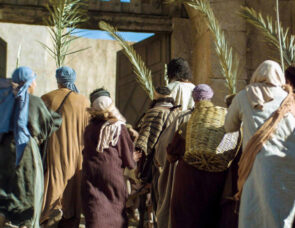A possible retelling of the events of Palm Sunday that comes at it from the point of view of two animals.

On your marks
Here is a possible retelling of the events of Palm Sunday that comes at it from the point of view of two animals. Their differing perspectives capture the unexpected reversal of where real power lies that this day in part has come to symbolise.
Get set
If you use this story with a group of children either in church or at a school assembly, it will work best if you become familiar with it first and make it your own story told from your heart rather than read from the printed page. It will also help if you can obtain two large pictures – one of a grand-looking horse and one of a rather tired-looking donkey!
Go!
Here is a horse that any rider would be proud of. Strong, sleek and swift. The sort of horse that people admired and envied. A horse for a leader – perhaps for a great general or even for a king to ride on. Well-groomed, well cared for and able to cut a dashing figure for its rider whether in the grand procession or on the battlefield. Such a horse was Marcellus – a Roman horse from long ago. Marcellus had been trained at the finest stables of his day. Marcellus had won prizes. Marcellus had seen active service with great men – the conquering heroes of the empire. He’d been ridden in the great triumphal processions in Rome itself, decked out in a fine golden and bejewelled harness and reins. Marcellus was a proud horse; a stately and superior horse; a horse to be reckoned with.
Here is a young donkey that no rider had ever yet ridden. Stubborn, slow and even rather silly-looking. The sort of animal people sometimes made fun of; a beast of burden to carry sacks of hay, bundles of sticks or even a load of rubbish for the tip. Not particularly well cared for and certainly not clean; an animal for the dirt track, the market place and the back alleyways. Such a donkey was Zedekiah – Zedy for short. Zedy lived in a shabby cattle stall on the outskirts of an ancient capital city in the Middle East. He was overlooked by most people and only kicked and shouted at by the rest; not owned by anyone important and never used for anything special; a poor animal and mostly in a sorry state.
At the time I’m thinking of, just over nineteen centuries ago, Marcellus was owned by a proud but weak Roman governor called Pontius Pilate. He’d been shipped overseas, not forgetting his fine livery and personal stable hands, to an out-of-the-way province of the great Roman Empire to do a tour of duty. At the garrison town of Caesarea, he marched proudly with the troops; led the governor’s procession on special occasions; and had been admired by local horseman, who recognised his greatness. Then came the day to march into Jerusalem; to take the governor to his residence there – a march of triumph designed to impress a conquered people; to show them who was boss and to stamp his hoof of authority over the ordinary people on his rider’s behalf. As they approached the city, Marcellus was expecting the usual fanfare of welcome – a jubilant and cheering crowd, a grand show but … but instead there wasn’t a sound. Not a soul came out to see them. Despite the splendour of his gold chains and saddle, despite the glory of his well-groomed mane, the streets were empty. The people hid defiantly out of sight. Pontius Pilate with drawn sword scowled but the Jews refused to welcome his rule. The Imperial Eagle was scorned and Marcellus, who was used to a royal welcome, trotted silently into the city, unrecognised and ignored.
Only a matter of weeks later, Zedy was tethered up, miserable as usual, to a post outside the cattle stall where he existed, when two men came and undid the rope to take him away. His grumpy owner had words with them briefly but it seemed OK and he was taken off towards the city. What was going on? Soon he was with other men and was having a coat but on his back and then one man in particular got on to him – Zedy’s first ever rider. But this rider was so sure of himself and so gentle in his control that Zedy did not resist. They set off towards Jerusalem. As they approached the city, crowds began to gather. Some shouted a warm welcome and others waved branches, singing ‘Hosanna! Welcome Him who comes in God’s name. Hosanna to the King’. Others put down their coats onto the road, like putting down a red carpet. It became a great procession of triumph – a victory march, a royal occasion – so much so that soon the whole city, it seemed, came out to welcome this special rider on the back of this very unspecial donkey. Zedy felt both proud and humbled at the same time. They called his rider Jesus. Zedy found him so light to carry and yet clearly he was the most important burden he’d ever borne in his entire life.
In a grand stable not too far away, Marcellus, disturbed by the noise, gave a jealous snort, because he knew that the welcome he should have had had gone to another. ‘All I hope’, he thought to himself, ‘is that all that noise is for some worthy animal. It must be a very splendid beast to receive so royal a welcome’.
If only he had known the truth!

 Download
Download